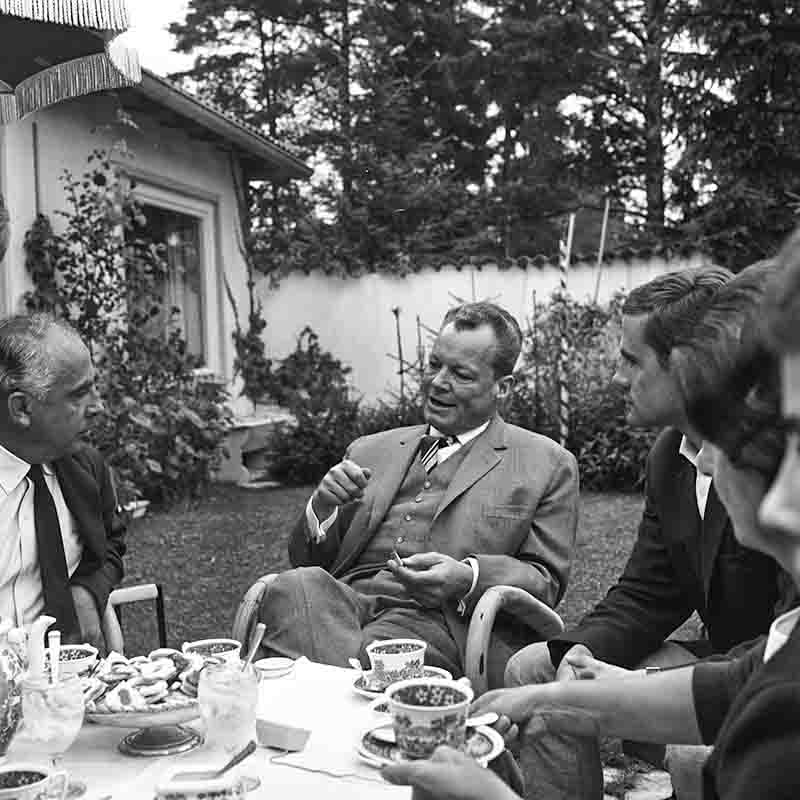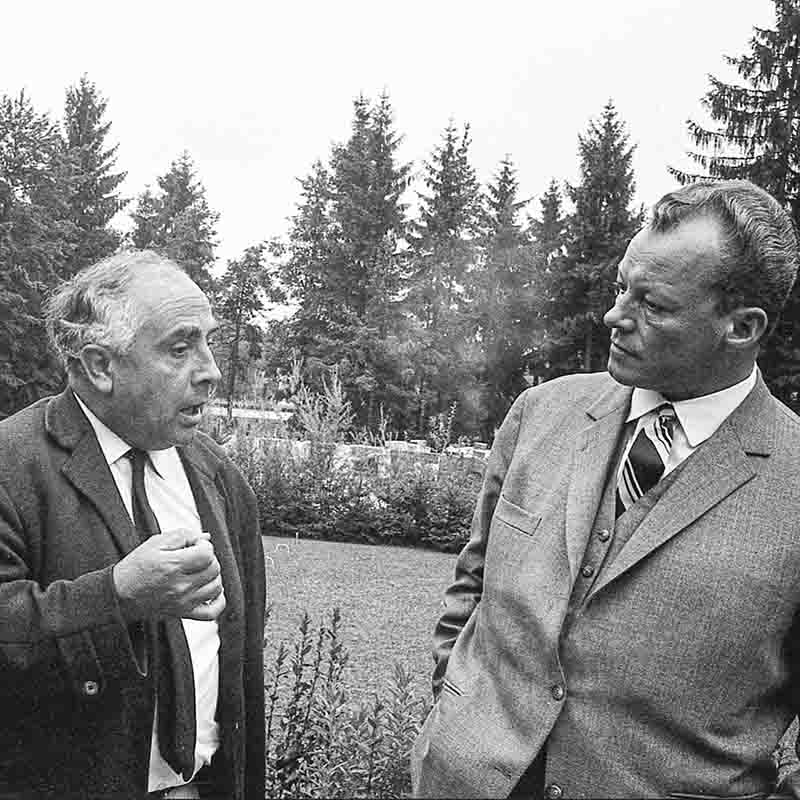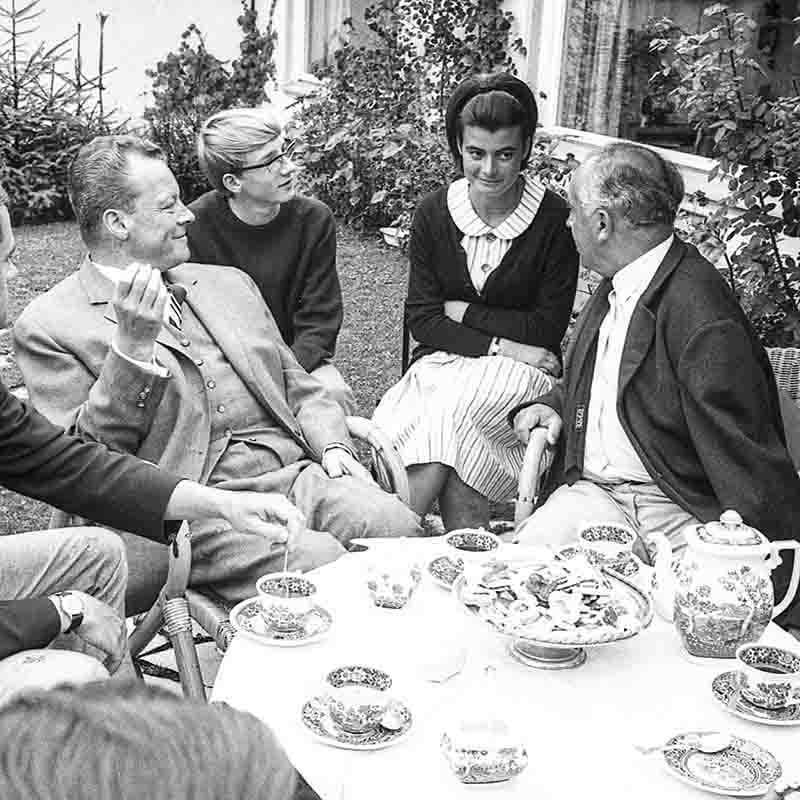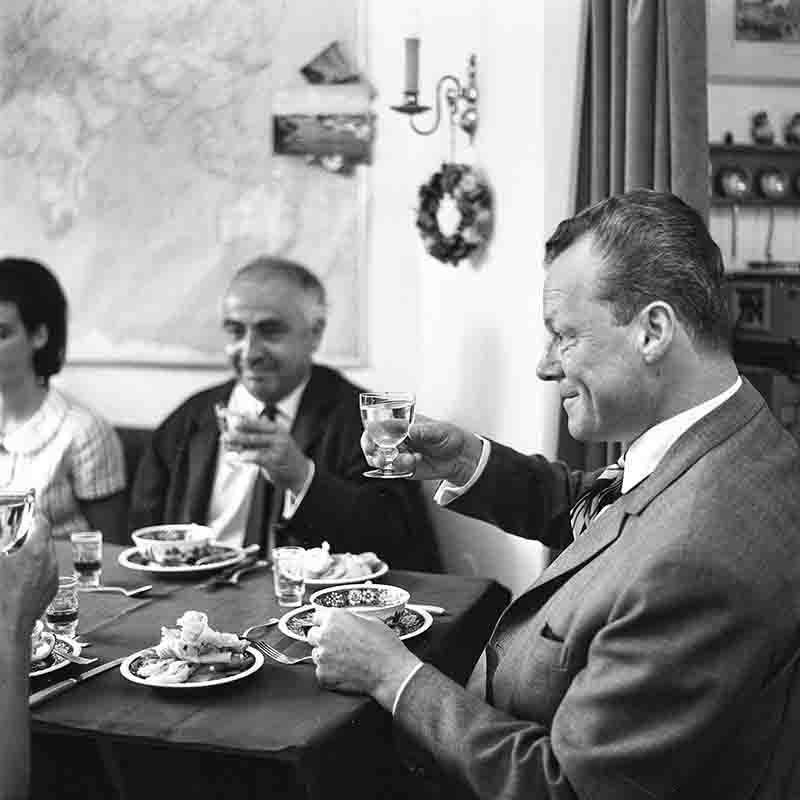Willy Brandt (born Herbert Ernst Karl Frahm, 1913-1992) was a German Social Democratic politician, mayor of West Berlin, foreign minister and Federal Chancellor (1969-1974), best known for his Ostpolitik, his 1971 Nobel Peace Prize and his role in shaping postwar German reconciliation and social reform.

In 1969, German photo journalist Peter Bock-Schroeder (1913-2001) accompanied Willy Brandt, the German Chancellor, participating in a controversial but polite discussion over coffee and cake in the home garden of a Munich family close to the Christian Social Union (CSU).
A Statesman for Peace and Reconciliation
The name Willy Brandt is synonymous with the pursuit of peace and reconciliation in post-World War II Europe.
As the Chancellor of West Germany from 1969 to 1974, Brandt's policies of Ostpolitik, or "Eastern policy," aimed to improve relations between West Germany and the Eastern Bloc countries, and ultimately, pave the way for German reunification.
12 key facts about Willy Brandt
-
Birth and Early Life: Willy Brandt was born Herbert Ernst Karl Frahm on December 18, 1913, in Lübeck, Germany. He adopted the name “Willy Brandt” while in political exile to protect himself from Nazi persecution.
Exile During the Nazi Era: After the Nazis came to power in 1933, Brandt fled Germany and lived in Norway and Sweden, where he worked as a journalist and political organizer in exile against Hitler’s regime.
Return to Germany After World War II: Brandt returned to Germany in 1945 and quickly became involved in postwar reconstruction and democratic politics as a member of the Social Democratic Party (SPD).
Mayor of West Berlin (1957–1966): As Governing Mayor of West Berlin, Brandt gained international attention for his leadership during the Berlin Crisis of 1961 and his firm stance against the construction of the Berlin Wall.
Chancellor of West Germany (1969–1974): Brandt served as Federal Chancellor from 1969 to 1974, leading a coalition government between the SPD and the Free Democratic Party (FDP).
Architect of Ostpolitik: His signature foreign policy, known as Ostpolitik, sought reconciliation and improved relations with East Germany, Poland, and the Soviet Union, recognizing postwar borders and promoting détente during the Cold War.
Nobel Peace Prize (1971): Brandt received the Nobel Peace Prize for his efforts to reduce East–West tensions and foster peace in Europe through diplomacy and cooperation.
The Warsaw Ghetto Kniefall (1970): During a visit to Poland in December 1970, Brandt unexpectedly knelt at the Warsaw Ghetto memorial, a spontaneous act of contrition that became one of the most powerful symbols of postwar German humility and reconciliation.
Domestic Reforms and Modernization: His government expanded education access (BAföG program), reformed family law, advanced social welfare, and promoted environmental protection—modernizing West Germany’s social structure.
The Guillaume Affair and Resignation: In 1974, Brandt resigned after it was revealed that his close aide Günter Guillaume was an East German spy. Although Brandt himself was not implicated, the scandal damaged his political credibility.
Global Statesman and the Brandt Report: After leaving office, Brandt chaired the Independent Commission on International Development Issues, producing the Brandt Report (1980), which urged global cooperation between industrialized and developing nations to fight poverty and inequality.
Death and Legacy: Willy Brandt died on October 8, 1992, in Unkel, Germany. He is remembered as a moral and visionary leader whose policies reshaped German democracy and contributed to European reconciliation. His legacy endures through the Willy-Brandt-Stiftung and numerous memorials, schools, and streets bearing his name.
As mayor of Berlin, he stood as a symbol of democratic resilience in a divided city, famously welcoming U.S. President John F. Kennedy during his 1963 visit, when Kennedy delivered his “Ich bin ein Berliner” speech. Brandt’s diplomatic poise and commitment to freedom won him recognition beyond Germany’s borders.
The Cold War and the Division of Germany

During the Cold War, Germany was divided into two states: the Federal Republic of Germany (FRG), commonly known as West Germany, and the German Democratic Republic (GDR), commonly known as East Germany.
The division of Germany was a direct result of the Second World War, in which Germany's defeat led to its partitioning among the victorious Allied powers.
The FRG, established in 1949, was a democratic state with a capitalist economy, while the GDR, established the same year, was a communist state with a planned economy.
The two states, separated by the Iron Curtain, were bitter rivals, and tensions between them were high.
Brandt's Ostpolitik

Brandt, who had been Mayor of West Berlin before becoming Chancellor, understood the importance of improving relations between the two German states.
He believed that the only way to achieve peace and reconciliation in Europe was through dialogue and cooperation.
With this in mind, he initiated a policy of Ostpolitik, which aimed to improve relations with the Eastern Bloc countries, including the Soviet Union and the GDR.
One of the key aspects of Brandt's Ostpolitik was the signing of treaties with the Eastern Bloc countries.
In 1970, West Germany and the Soviet Union signed the Treaty of Moscow, which recognized the post-war borders of Europe and renounced the use of force to settle disputes.
This was followed by the signing of the Quadripartite Agreement on Berlin in 1971, which ensured the continued presence of the Western powers in West Berlin.
Brandt's efforts towards reconciliation were not limited to the diplomatic sphere. He also took steps to improve relations with the GDR, with the goal of ultimately achieving reunification.
In 1972, the two German states signed the Basic Treaty, which established diplomatic relations and paved the way for further cooperation.
The most iconic moment in German post-war history
In 1970, during a visit to Poland, Willy Brandt spontaneously dropped to his knees at the Monument to the Ghetto Heroes in Warsaw.
This act, known as the "Kniefall von Warschau", was seen as a gesture of humility and remorse for the atrocities committed by the Nazis during World War II.
It was a powerful symbol of reconciliation and has become one of the most iconic moments in German history.
A Nobel Peace Prize

Brandt's efforts towards peace and reconciliation were recognized by the international community. In 1971, he was awarded the Nobel Peace Prize for his work towards improving international relations.
In his acceptance speech, Brandt stressed the importance of dialogue and cooperation in achieving peace, and called for disarmament and the reduction of tensions between the East and West.
Willy Brandt's anti-nuclear stance
Willy Brandt was a strong advocate for disarmament and opposed the deployment of nuclear weapons in Europe.
He was a vocal critic of the arms race and advocated for the reduction of nuclear weapons. He also supported the creation of a nuclear-free zone in Europe.
Willy Brandt's social democratic policies

As a member of the Social Democratic Party (SPD), Willy Brandt championed social democratic policies such as progressive taxation, state-funded healthcare, and the expansion of social welfare programs.
He also supported the rights of workers and labor unions.
Willy Brandt's relationship with the Soviet Union
Willy Brandt's Ostpolitik policy was focused on improving relations with the Soviet Union and the countries of the Eastern Bloc.
He played a key role in the signing of the Treaty of Moscow in 1970, which normalised relations between West Germany and the Soviet Union.
Contributions to European integration
Willy Brandt was a strong supporter of European integration and believed that it was essential for peace and stability in Europe.
He played a key role in the creation of the European Economic Community (EEC), which eventually evolved into the European Union (EU).
Willy Brandt's role in German reunification
As the leader of the Social Democratic Party (SPD) and Chancellor of West Germany, Willy Brandt played a significant role in shaping the political and social climate that eventually led to the reunification of Germany in 1990.
His Ostpolitik policy of improving relations with the Eastern Bloc countries helped to ease tensions and create a more favourable climate for reunification.
However, reunification was not achieved during Brandt's tenure as Chancellor and it was the subsequent governments and leaders who were able to bring about the reunification of Germany.
The Legacy of Willy Brandt

Despite his successes, Brandt's chancellorship was not without controversy. His government was plagued by economic troubles, and his approval ratings began to decline.
In 1974, he resigned as Chancellor following a scandal involving an East German spy who had infiltrated his inner circle.
Willy Brandt's legacy is one of peace and reconciliation. His Ostpolitik helped to ease tensions between the East and West and pave the way for further cooperation.
His efforts towards reunification played a crucial role in the eventual fall of the Berlin Wall and the reunification of Germany.
Today, as the world continues to grapple with the challenges of division and conflict, the example of Willy Brandt serves as a reminder of the power of dialogue and cooperation in achieving peace and reconciliation.
Willy Brandt's message was of peace, to build a world in which all nations and peoples can live in security and harmony.
Willy Brandt: FAQ
Propaganda Broadcast
Psychological Warfare Operation
